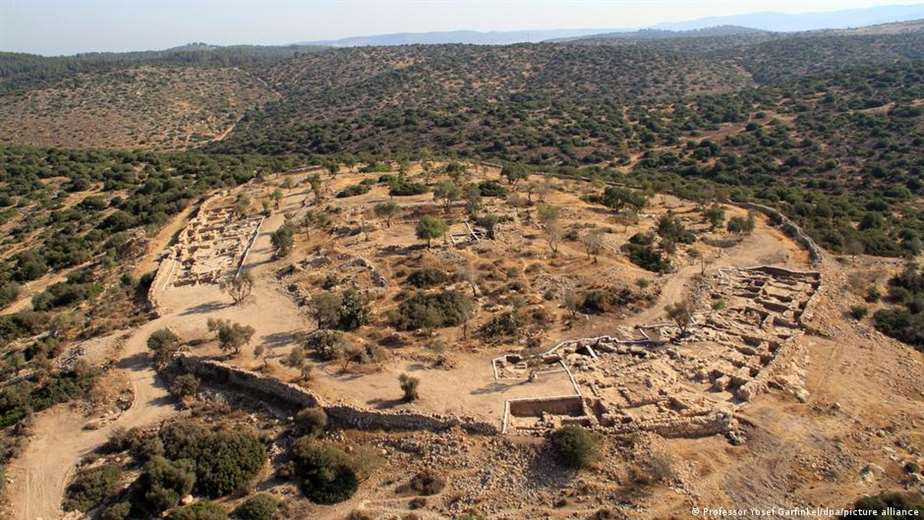
July 13, 2023, 20:44 PM
July 13, 2023, 20:44 PM
A recent investigation has revealed amazing findings that they could rewrite the ancient history of Jerusalem. According to this study, led by the renowned Professor Yosef Garfinkel of the Institute of Archeology of the Hebrew University, a network of fortified cities around Jerusalem dating back to the time of King David has been located. This challenges the previous belief that the expansion of the kingdom of Judah occurred much later, almost 200 or 300 years after David’s reign, in the late 9th or 8th century BC.
These findings thus support the theory that King David ruled ua vast and highly developed kingdomwith a well-established infrastructure, including a network of roads connecting the fortified cities, sparking another round of heated debate over whether the reign of these Biblical monarchs was fact or myth and raising the possibility that King David was not simply a humble shepherd, but a powerful leader, according to various media reports in Israel.
five fortified cities
Specifically, in his new article, published in the Jerusalem Journal of Archeology and peer-reviewed from Hebrew University, Garfinkel claims to have found evidence of urban settlement in organized cities, a network of five fortified cities, dating to around 1,000 BC, during the reign of King David.
According to the study, all five cities appear to have a similar layout, in particular two parallel walls that encompass the inner part of the city, which suggests that they were part of a unified network. They are also linked by a series of organized pathways, further implying that they were deeply connected as part of one kingdom.
The Biblical Description of David
As reported Times of Israel, this would thus go against the belief of some scholars of the minimalist school of thought who have previously suggested that since there is little evidence for the existence of cities during the reign of King David, his position as ruler of a great kingdom, such as is written in the bible, it could be exaggerated.
In that sense, Garfinkel’s new research supports a closest reading to the biblical description of David who, in biblical terms, became king of the tribe of Judah and, in time, of all the tribes of Israel.
“I hate to use the term ‘trying to prove the Bible’, because I’m not trying to prove anything,” Garfinkel told Times of Israel. “There are Biblical traditions, and we can see if they have historical accounts or not… That doesn’t mean that they are 100% all historical accounts. Sometimes there are errors, sometimes there is inventiveness, sometimes there is ideology.”
Garfinkel cautioned against subscribing to extremes in either school of thought. “There are those who think that everything [lo de la Biblia] is useful, and there are those who think that nothing is useful, but That’s not science, it’s theology,” he said.
“The minimalists want to say that David ruled a small village and that there is no kingdom, and I say that there was a kingdom with fortified cities a day’s walk from Jerusalem”declared, for his part, Garfinkel to the Israeli newspaper Haaretz.
“I’m not that maximalist. What I’m saying is that David’s kingdom included Jerusalem, Hebron and some cities around it: that’s the urban core of David’s kingdom. I think it’s realistic,” Garfinkel added.
Some critics aren’t so sure
Garfinkel’s study was met with a great deal of skepticism by many fellow archaeologists, who claim that his conclusions are based on assumptions and misinterpreted data. Others consider that his interpretation is reductionist and marks an attempt to affirm the narrative of the Hebrew Bible.
“I think it’s an oversimplification and that it’s flattening the details. There are a lot of little details I disagree withand there are generalizations over a wide period that are problematic,” he told Times of Israel Professor Aren Maeir, an archaeologist at Bar Ilan University.
For example, there is controversy over whether Khirbet Qeiyafa, which Garfinkel cited as one of the cities in the network, was actually a Judahite or a Canaanite city, Maeir said. “Once you start building a whole kingdom-sized scenario at various points, and they’re based on assumptions not clearly proven, you’re building a house of cards”said.
Maeir believes that there was a historical King David who ruled a kingdom in Jerusalem, but he has not seen sufficient evidence to clearly establish the size or the complexity of the area under the rule of King David.
“It’s like when a fisherman tells you what kind of fish he’s caught, and with each story his arms get wider,” Professor Maeir said. “Is it a sardine, a mackerel or a blue whale? If the biblical text is read and taken literally, then it is a blue whale. I think there was probably a small kingdom in Jerusalem, but we don’t know how influential this kingdom was,” she concluded.












